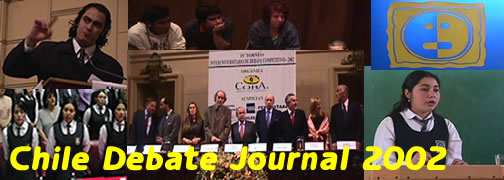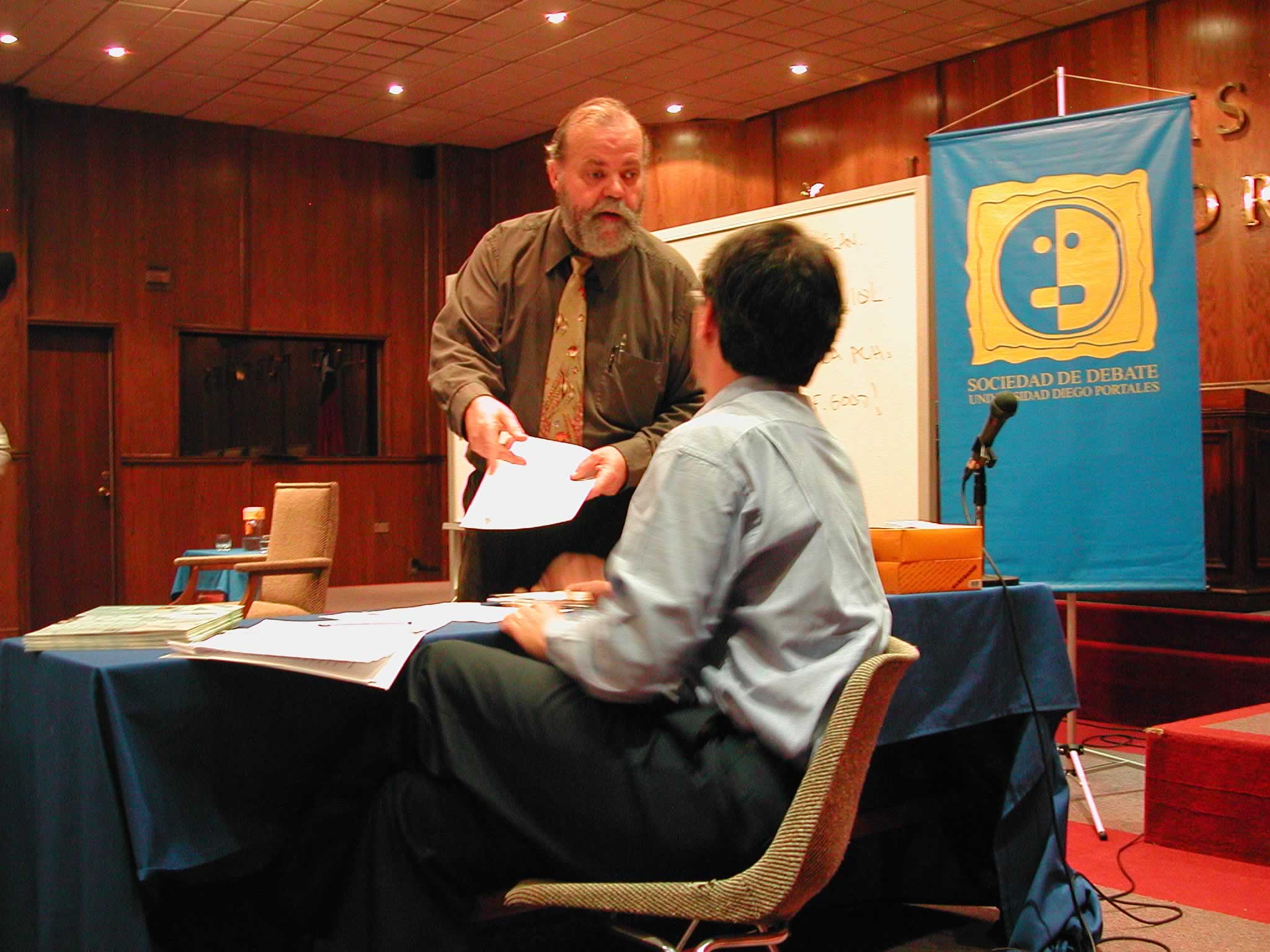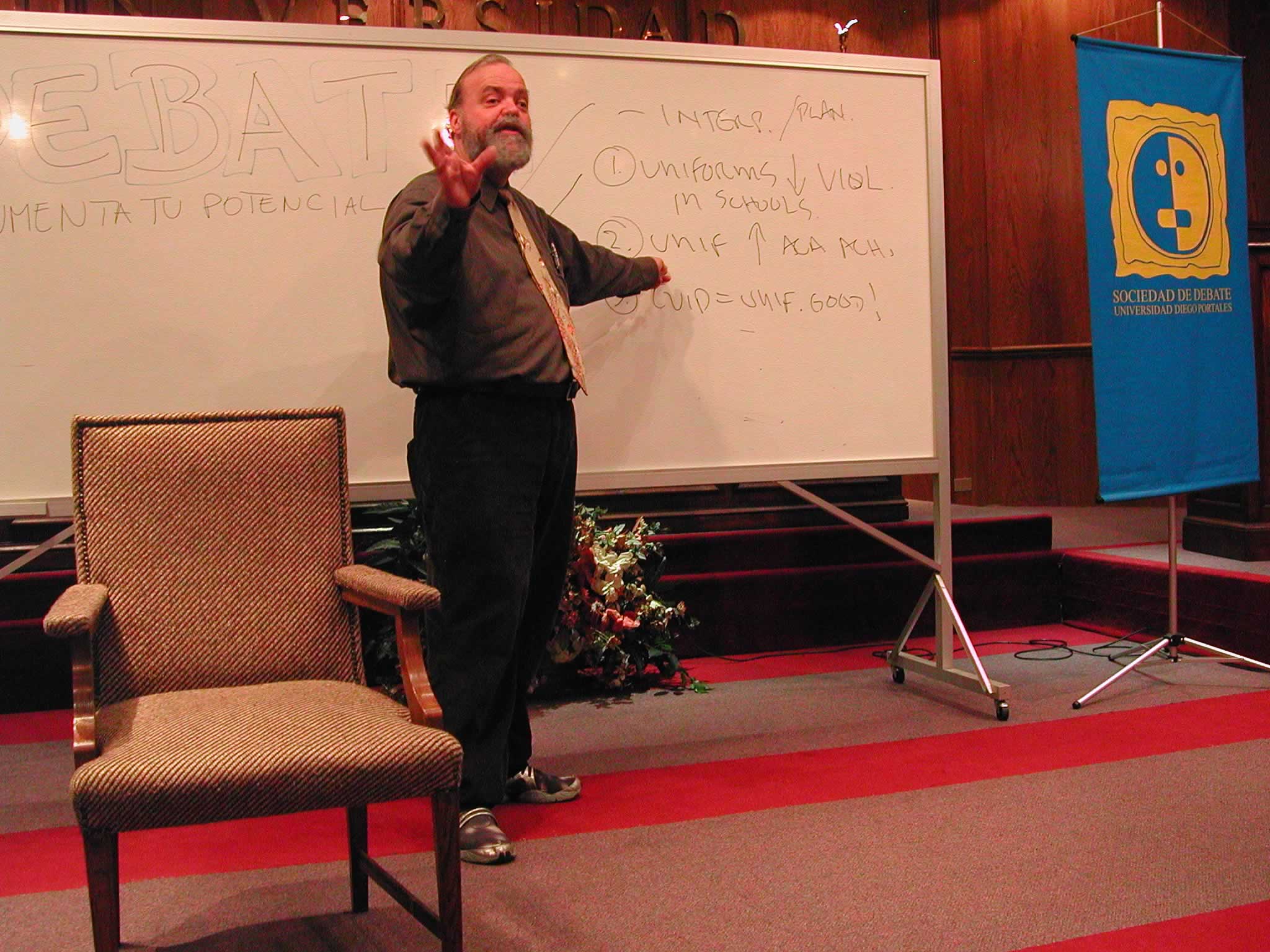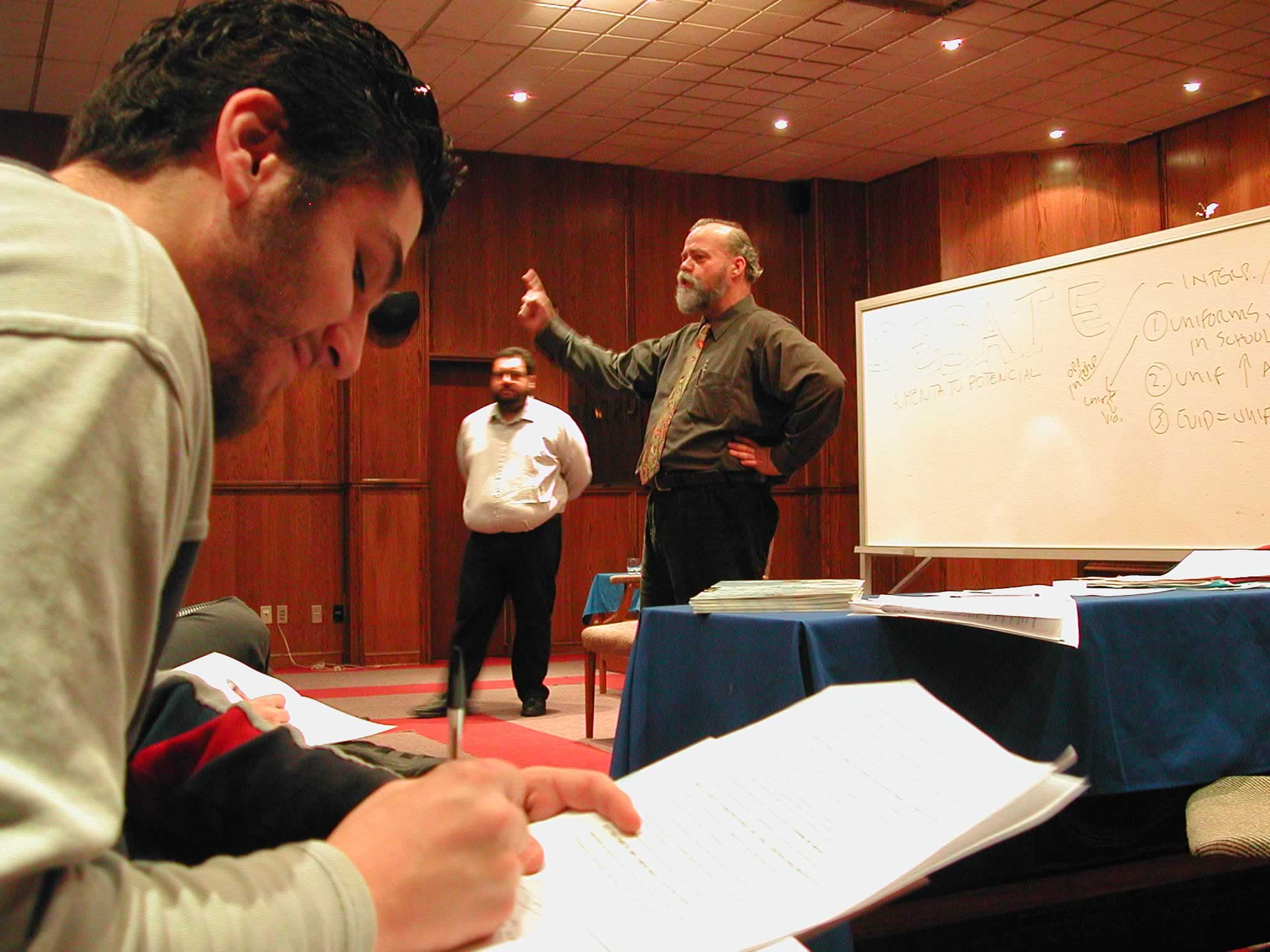

| Introduction | 11/22 | 11/23 | 11/24 | 11/25 | 11/26 | 11/27 | 11/28 | 11/29 | Alfred C. Snider | Debate Central |
I was shocked to awaken and
find that it was already 8:30 AM. I was due over at UDP at 8:45 AM and about
9:00 AM was show time. I was angry at the lack of a wake up call, but knew that
I am always the one responsible for awakening to begin the day. I threw on some
clothes, brushed my hair and teeth, and bolted out of the door without a morning
bath. While I was prepared for my presentations I was not yet awake and in a
bad mood. I like to be fully awake and jovial for such a presentation, and I
had to work quickly to change my level of alertness and mood.
I left the hotel without bothering
to waste time on a complaint about my wake up call. That could wait. I decided
not to try and sprint the distance to UDP and immediately grabbed a taxi. Taxis
in Santiago are seemingly omnipresent and very reasonable. We were challenged
by traffic but soon were at the auditorium. I found it locked and no one waiting
there. I bolted across the street to the Sociedad de Debate offices and found
Andrea and others stuffing the last few packets for the students and teachers.
We then went to the auditorium and had it opened. At 8:55 AM there were only
about eight students there. I was worried. We had predicted 70 students. I begged
for someone to get me some water so that I could at least be hydrated for the
event. I told them we would not need a public address system because I was loud
and the auditorium was not that large. I was scheduled to be introduced at 9:05
AM and begin at 9:10 AM. By 9:07 AM the room was full and a count showed 85
people. Some teachers who were scheduled to be at the afternoon sessions were
there early. My translator Rodrigo was there, Paco was on the scene changing
the lights, and we started perhaps two or three minutes late. Paco introduced
me as Benito had a meeting that morning about adding new debate related courses
to the UDP curriculum.

| TUNA & PACO PREPARE | UDP POSSE - RIGHT TO LEFT: CLAUDIO, BENITO, PAOLA,
AUTHOR, PACO, RODRIGO |
I started out by telling them
my story, the story of a young boy who disliked school, was almost held back
a grade, and was a serious discipline problem until he found debate in the 8th
grade. I like to give this testimony, because it is honestly my story and it
makes me feel good to tell it, but also because the students can relate to it
– my dissatisfaction with the strictures of the school environment that tried
to make me passive and quiet, my love for learning that was being stunted by
being forced to study what others wanted how they wanted it studied, and my
problems with authority figures, some of which I still have but have learned
how to constructively manage.


| PRESENTATION TO HIGH SCHOOL DEBATERS |
The first section of my work
with the students this day was on how to analyze a debate topic and prepare
pro and con cases on the same. I discussed basic topic analysis but included
a fairly large section on brainstorming and creative thinking. The students
were amazingly attentive. This was doubly impressive because we did not have
simultaneous translation, as I would talk and then Rodrigo would translate.
This continuity makes it easy to drift off during the portions that are not
in your language, but the students really seemed to be hanging in there, constantly
taking notes and giving the kind of non-verbal signals that I interpret as genuine
interest. They all had an outline of my talk translated into Spanish, so I am
sure that helped somewhat, along with Rodrigo’s excellent translation. They
were an interesting group, some in normal youth clothing, others in smart school
uniforms, while others were in ill-fitting uniforms that were probably passed
on to them because they could not afford their own new uniforms. I had been
told that many students cannot afford uniforms and so have to use cast off or
donated uniforms. Shoes are also a problem for many of these students. Yet,
they had come from all over Santiago, from outlying towns, and some of them
had traveled all night to be there. Several teachers had traveled twelve hours
to see my presentations. I took this as quite a challenge. I needed to be pretty
damn good to justify the kinds of sacrifices they had made to attend my workshop.
As a result, I stepped up the pace and took the ideas to somewhat higher levels
of sophistication. It no longer mattered to me that I had no bath or breakfast
that morning, I had a very special and serious obligation to do right by these
young fans of debate that I had come to the southern hemisphere to work with.
After my topic analysis presentation
we were scheduled for a short break with beverages and cookies. Rodrigo Rojas
had told me that one of the secrets to good debate training in Chile was to
punctuate it with food, as many of the students had not had a real breakfast.
So when a huge pile of cookies appeared along with some beverages that quickly
disappeared. I never made it to the snacks because they vanished quickly and
a large group of students had questions for me, questions that were challenging
and insightful. I decided if they could forego the snacks I could as well.
We began the next session
right on schedule. We divided them up into seven groups (because only had seven
facilitators) and assigned to different parts of the auditorium. Each group
was given a topic and assigned to develop a topic interpretation as well as
an outline of a case. After 30 minutes of this they would come forward one by
one and present their case ideas to the entire group. They all would come forward
and a small group of spokespeople would explain their ideas. In this way they
would be exposed to many different approaches to many different topics. The
facilitators would then select the best two groups and present them with small
tokens of achievement (refrigerator magnets with the debate schedule on them).
| STUDENTS WORK IN SEVEN SMALL GROUPS TO PREPARE BASIC ARGUMENTS ON BOTH SIDES
OF DIFFERENT TOPICS |
They broke up into groups
easily and quickly and began working in earnest. I jumped from group to group
watching, listening, and snapping some photos. The facilitators did not dominate
the discussion, but directed it. The students were active and vocal. I only
wish we could have had 14 groups instead of seven. Several of the groups had
good questions about what they should include in their presentations. They all
finished right on time and we went through the presentations.
I used my usual awards assembly
hype voice to tell the groups to “come on down” one by one. They all filled
their allotted time and none went over, and all groups got a big round of applause
at the end of their presentations. After it was over and while the judges were
deciding which two groups did the best job I gave the students one of my exhortations
about debate, critical thinking, and the need to use cognition and communication
to rise above barriers of class and race, barriers that these students felt
acutely, especially in terms of class. The present is a better time to do that,
given the rapidity with which things are changing and the central role that
information and communication now play in creating personal success.
| GROUPS GIVE REPORTS ON THEIR CASE IDEAS AND OPPOSITION STRATEGIES |
Paola had been the chair of
the evaluation and announced the two winning groups. They came forward to get
their magnets. Unfortunately, we ran out of magnets for two students, and they
had to remain satisfied with a hug and a handshake from me.
Many students left but a good
number remained behind and asked me questions. Out front they were receiving
their certificates for attending and many brought them back to have me autograph
them. I enjoyed talking with them but felt silly signing things, but tried to
be cooperative. I taught them some new handshakes and we talked about music
as well as debate. Then, it was over for the first part of the day.
I went with Benito and Paola
and to the UDP commons for lunch. I was very hungry. We went through the line
and it was salad, chicken or meatballs, pasta or rice, fruit and other offerings
for dessert. Lunch is the traditional big meal of the day in Chile. When they
say salad, they mean it. There always seem to be six or seven different kinds
of salad here at the UDP commons and when you order salad you get to choose
three. They are all quite unique and tasty, and I have never had one that I
did not like. I tried meatballs with sauce over pasta, and for dessert "mote
con wosillo." This is a mildly sweet thin clear sauce combined with some
kinds of grain that has floating in it a sort of processed fruit that is very
chewy. We discussed the events of the morning and talked briefly about the program
for the afternoon.
I met my translator Rodrigo
back at the auditorium and the teachers began to arrive. There would end up
being about 25 of them. Pace had
prepared a packet for each of them containing translations of all of the material
I would be covering that day along with other reference material.
I told them my story even
though several of them had heard it before. Then it was on to the main topic
for the day -- debate across the curriculum. Besides writing a book with Maxwell
Schnurer (Many sides: debate across the curriculum, New York: Central European
University Press, 2002) I have made a number of presentations on this subject,
and this is one that I know how to do. They had asked for THREE HOURS on this
subject. The teachers were all people who worked with debate but were also teachers
of other subjects, mostly history, literature, and language. This means that
they knew some things about debate, but were curious about specific issues concerning
classroom use. This was the most intense and in-depth session on this subject
I have never had. They were endlessly energetic and asked many, many complex
and sophisticated questions. As I have said many of these teachers had come
from the distant south, many had traveled all night, and two had spent 12 travel
hours. Impressive.
| TEQCHERS ASKED MANY EXCELLENT QUESTIONS | TEACHERS WORKSHOP GROUP |
We took a break after about
2.5 hours and coffee and cookies were served. I was starting to lose energy
so I took a quick walk around the block to recharge and when I got back I actually
had a cup of coffee. Given that I have broken my caffeine addiction, whenever
I do drink coffee I get quite a jolt. I needed it.
We began again on the last
parts of the debate across the curriculum presentation, and the questions and
comments just kept coming. Miguel, the camera operator, also asked a series
of excellent questions, showing me that he wasn’t just behind the camera all
day, but was listening carefully and seemed genuinely interested in debate.
His questions indicated that we largely agree about the holistic approach to
debate and evaluation – that attempts to separate out form and content deny
the complex interactions between the two, how one becomes the other. This was
difficult for some of the teachers, who were concerned about clear evaluation
of the students and concrete criteria to use in judgment.
Time was running out but their
enthusiasm was not as we began an examination of my last requested topic, the
user of debate to reach so-called “problem students” with a new form of educational
practice. I was beginning to fatigue, but fortunately the materials that had
been translated were excellent and fairly complete, and I was able to finish
without too much embarrassment due to low energy. At the conclusion Benito presented
people with their certificates of participation, and after some informal talks
the session ended. We posed for a group photograph, of course.
We all went back to the offices
of Sociedad de Debate where I had a few things to wrap up. My presentations
the next day were to utilize simultaneous translation, so I wanted to make sure
that the video Miguel would make would have the audio track in Spanish. We talked
about how to do this and after inspecting the equipment AI knew what kind of
connecting cord we would need and I described it to people. Paco then found
the perfect cord, and we knew all was well for the morrow. I was not sure of
the exact location for my presentations, but Benito helped me get the correct
address and a map to use with the taxi driver, something I am very glad he did.
I walked back to my hotel
but made sure to stop and buy some bottled water for my room. I also stopped
at Café Don Julian, my now established hang out, for an end of day drink. It
was good to just sit in the quiet after such an active day. I nursed my one
drink into a 45-minute experience, and then went to my hotel room. I worked
on this journal and my presentations for the next day for a while, and then
stepped out to get a simple sandwich for dinner. I returned and added a new
conclusion to my judging presentation for the morning, watched a bit of BBC
news, and then went off into dreamland. It is at just about this point in each
trip that my dream life becomes more active and I must say I had a few interesting
dreams that night, none frightening and all bizarre, but enjoyable and not disturbing
of my rest.